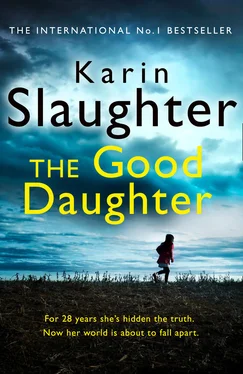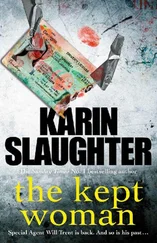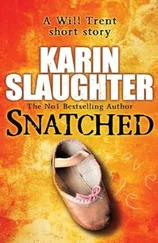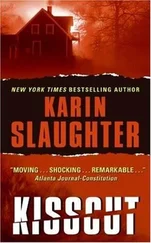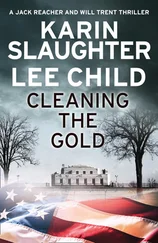“Charlie!” Gamma stood on the stoop outside the kitchen doorway. Her hands were on her hips. “Come set the table.”
Charlotte turned to Samantha and said, “Last word!” before she jogged toward the house.
“Dipshit,” Samantha muttered. You didn’t get the last word on something just by saying the words “last word.”
She moved more slowly toward the house on rubbery legs, because she wasn’t the moron who couldn’t reach back and wait for a baton to be slapped into her hand. She did not understand why Charlotte could not learn the simple handoff.
Samantha left her shoes and socks beside Charlotte’s on the kitchen stoop. The air inside the house was dank and still. Unloved , was the first adjective that popped into Samantha’s head when she walked through the door. The previous occupant, a ninety-six-year-old bachelor, had died in the downstairs bedroom last year. A friend of their father was letting them live in the farmhouse until things were worked out with the insurance company. If things could be worked out. Apparently, there was a disagreement as to whether or not their father’s actions had invited arson.
A verdict had already been rendered in the court of public opinion, which is likely why the owner of the motel they’d been staying at for the last week had asked them to find other accommodations.
Samantha slammed the kitchen door because that was the only way to make sure it closed. A pot of water sat idle on the olive-green stove. A box of spaghetti lay unopened on the brown laminate counter. The kitchen felt stuffy and humid, the most unloved space in the house. Not one item in the room lived in harmony with the others. The old-timey refrigerator farted every time you opened the door. A bucket under the sink shivered of its own accord. There was an embarrassment of mismatched chairs around the trembly chipboard table. The bowed plaster walls were spotted white where old photos had once hung.
Charlotte stuck out her tongue as she tossed paper plates onto the table. Samantha picked up one of the plastic forks and flipped it into her sister’s face.
Charlotte gasped, but not from indignation. “Holy crap, that was amazing!” The fork had gracefully somersaulted through the air and wedged itself between the crease of her lips. She grabbed the fork and offered it to Samantha. “I’ll wash the dishes if you can do that twice in a row.”
Samantha countered, “You toss it into my mouth once, and I’ll wash dishes for a week.”
Charlotte squinted one eye and took aim. Samantha was trying not to dwell on how stupid it was to invite her little sister to throw a fork in her face when Gamma walked in carrying a large cardboard box.
“Charlie, don’t throw utensils at your sister. Sam, help me look for that frying pan I bought the other day.” Gamma dropped the box onto the table. The outside was marked EVERYTHING $1 EA. There were dozens of partially unpacked boxes scattered through the house. They created a labyrinth through the rooms and hallways, all filled with thrift store donations that Gamma had bought for pennies on the dollar.
“Think of the money we’re saving,” Gamma had proclaimed, holding up a faded purple Church Lady T-shirt that read “Well, Isn’t That SPE-CIAL?”
At least that’s what Samantha thought the shirt said. She was too busy hiding in the corner with Charlotte, mortified that their mother expected them to wear other people’s clothes. Other people’s socks. Even other people’s underwear until thank God their father had put his foot down.
“For Chrissakes,” Rusty had yelled at Gamma. “Why not just sew us all up in sackcloth and be done with it?”
To which Gamma had seethed, “Now you want me to learn how to sew ?”
Her parents argued about new things now because there were no longer any old things to argue about. Rusty’s pipe collection. His hats. His dusty law books splayed all over the house. Gamma’s journals and research papers with red lines and circles and notations. Her Keds kicked off by the front door. Charlotte’s kites. Samantha’s hair clips. Rusty’s mother’s frying pan was gone. The green crockpot Gamma and Rusty had gotten for a wedding present was gone. The burnt-smelling toaster oven was gone. The owl kitchen clock with the eyes that went back and forth. The hooks where they left their jackets. The wall that the hooks were mounted to. Gamma’s station wagon, which stood like a dinosaur fossil in the blackened cavern that had once been the garage.
The farmhouse contained five rickety chairs that had not been sold in the bachelor farmer’s estate sale, an old kitchen table that was too cheap to be called an antique and a large chiffarobe wedged into a small closet that their mother said they’d have to pay Tom Robinson a nickel to bust up.
Nothing hung in the chiffarobe. Nothing was folded into the keeping room drawers or placed on high shelves in the pantry.
They had moved into the farmhouse two days ago, but hardly any boxes had been unpacked. The hallway off the kitchen was a maze of mislabeled containers and stained brown paper bags that could not be emptied until the cabinets were cleaned, and the cabinets would not be cleaned until Gamma forced them to do it. The mattresses upstairs rested on bare floors. Overturned crates held cracked lamps to read by and the books that they read were not treasured possessions but on loan from the Pikeville public library.
Every night, Samantha and Charlotte hand-washed their running shorts and sports bras and ankle socks and Lady Rebels Track & Field T-shirts because these were among their few, precious possessions that had escaped the flames.
“Sam.” Gamma pointed to the air conditioner in the window. “Turn that thing on so we can get some air moving in here.”
Samantha studied the large, metal box before finding the ON button. Motors churned. Cold air with a tinge of wet fried chicken hissed through the vent. Samantha stared out the window at the side yard. A rusted tractor was near the dilapidated barn. Some unknown farming implement was half-buried in the ground beside it. Her father’s Chevette was caked in dirt, but at least it wasn’t melted to the garage floor like her mother’s station wagon.
She asked Gamma, “What time are we supposed to pick up Daddy from work?”
“He’ll get a ride from somebody at the courthouse.” Gamma glanced at Charlotte, who was happily whistling to herself as she tried to fold a paper plate into an airplane. “He has that case.”
That case.
The words bounced around inside Samantha’s head. Her father always had a case, and there were always people who hated him for it. There was not one low-life alleged criminal in Pikeville, Georgia, that Rusty Quinn would not represent. Drug dealers. Rapists. Murderers. Burglars. Car jackers. Pedophiles. Kidnappers. Bank robbers. Their case files read like pulp novels that always ended the same, bad way. Folks in town called Rusty the Attorney for the Damned, which was also what people had called Clarence Darrow, though to Samantha’s knowledge, no one had ever firebombed Clarence Darrow’s house for freeing a murderer from death row.
That was what the fire had been about.
Ezekiel Whitaker, a black man wrongly convicted of murdering a white woman, had walked out of prison the same day that a burning bottle of kerosene had been thrown through the Quinns’ bay window. In case the message wasn’t clear enough, the arsonist had also spray-painted the words NIGGER LOVER on the mouth of the driveway.
And now, Rusty was defending a man who’d been accused of kidnapping and raping a nineteen-year-old girl. White man, white girl, but still, tempers were running high because he was a white man from a trashy family and she was a white girl from a good one. Rusty and Gamma never openly discussed the case, but the details of the crime were so lurid that whispers around town had seeped in under the front door, mingled through the air vents, buzzed into their ears at night when they were trying to sleep.
Читать дальше
